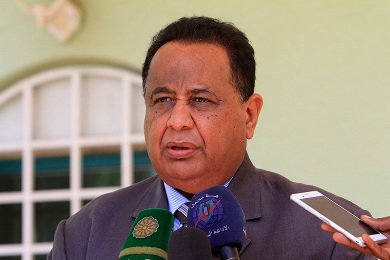Sudan wouldn’t abandon sovereignty over Halayeb triangle: FM
May 2, 2016 (KHARTOUM) – Sudan’s Foreign Minister Ibrahim Ghandour on Monday said his country wouldn’t abandon its sovereignty over the disputed Halayeb region.

The area has been under Cairo’s full military control since the mid-1990’s following a Sudanese backed attempt on former Egyptian President Mohamed Hosni Mubarak’s life.
Egypt brushed aside Sudan’s repeated calls for referring the dispute to international arbitration.
Ghandour, who addressed the Sudanese parliament on Monday, said “we wouldn’t abandon our sovereignty over Halayeb triangle. We took the necessary legal and political measures to preserve our rights”.
He added that his government seeks to get the text of the agreement signed between Egypt and Saudi Arabia on the Teran and Snafir islands to find out its impact on Sudan’s sovereignty over Halayeb.
On 8 April 2016, Egypt and Saudi Arabia signed a maritime border agreement that re-establishes maritime zones in the Red Sea between the two countries.
Media reports said the maps included in the deal show Halayeb as part of the Egyptian territory.
Also, the Saudi ambassador in Cairo was quoted as saying that Riyadh recognizes Halayeb as part of Egypt.
“We want to figure out the impact of this agreement on our maritime borders,” Ghandour said.
“Despite the fact that the relationship between Cairo and Khartoum is at its best, Sudan hadn’t and wouldn’t abandon its national sovereignty,” he added.
In a statement issued last month, the Sudanese foreign ministry further called on Egypt to engage in direct negotiations to resolve the Halayeb issue in the same way as it did with Saudi Arabia or resort to international arbitration as is has done in the dispute with Israel over Taba area.
However, Egypt’s Foreign Ministry Spokesperson Ahmed Abu Zaid responded to the statement saying that “Halayeb and Shalateen are Egyptian territory and they fall under Egyptian sovereignty and Egypt has no additional comment on the statement issued by the Sudanese foreign ministry”.
Meanwhile, Egyptian judicial sources said that a delegation from the ministry of justice would travel to Halayeb to lay the foundation for the first court in the area.
Al-Youm Al-Sabi’ website on Monday reported that the delegation would travel to Halayeb in accordance with the last week’s decision by the minister of justice to establish a court complex in the region.
UAE AND HALAYEB
Meanwhile, Sudan’s foreign ministry said it initiated diplomatic contacts with the United Arab Emirates (UAE) to investigate the credibility of media reports that an Abu-Dhabi based company has proposed to launch energy projects in the disputed Halayeb region.
Foreign Ministry Spokesperson Ali al-Sadiq ruled out the involvement of the UAE in the dispute between Sudan and Egypt over Halayeb.
He told reporters on Monday that the UAE enjoys balanced and prudent ties with all nations of the world, saying such a country wouldn’t get involved in “undiplomatic” actions.
It is noteworthy that the official website of the Abu Dhabi Future Energy Company (Masdar) said the company handed over four clean energy projects to the Egyptian government.
According to Masdar, the projects included designs of solar power plants for Halayeb, Abu Ramad and Shalateen in order to support the tourism sector in the triangle.
The company’s website further published a map of Egypt showing the sites of the proposed projects including the disputed Halayeb region.
(ST)
